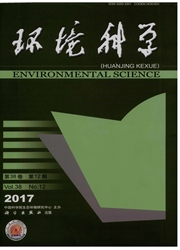

 中文摘要:
中文摘要:
采用实验室驯化的亚硝酸盐反硝化菌群作为菌种,优化亚硝酸盐降解条件,探究在氧化还原介体蒽醌-2-磺酸钠(AQS)存在条件下亚硝酸盐反硝化的特性.结果表明,反硝化菌群降解亚硝酸盐的最适条件为:温度35℃,pH为8,丁二酸钠为碳源,碳氮比4∶1,初始亚硝酸盐浓度100 mg.L-1;AQS的最佳投加量为0.16 mmol.L-1,介体调控的反硝化体系氧化还原电位略有降低,维持在-400~-500 mV之间,pH随亚硝酸盐降解速率增加而增大,最终稳定到9~10之间;通过分析反硝化中间代谢产物,推测AQS在亚硝酸盐反硝化过程中不仅起到辅酶CoQ的作用而且加速了细胞色素传递电子的全过程.本研究可为氧化还原介体调控亚硝酸盐反硝化实际应用提供理论基础和优化参数.
 英文摘要:
英文摘要:
This study optimized the nitrite degradation conditions and explored the characteristics of nitrite degradation with redox mediators and nitrite denitrifying bacteria.The results suggested that the optimal condition of nitrite denitrification was 35℃,pH = 8.0,sodium succinate as the carbon source,the C / N rate of 4 and the initial nitrite concentration of 100 mg.L-1;the optimal AQS concentration was 0.16 mmol.L-1;ORP values stabilized around-400 mV to-500 mV with AQS,which were lower than that of controls during the denitrification process;the pH changed with nitrite removal and stabilized at 9 to 10;through the analysis of denitrifying intermediate metabolites,the impact of AQS on nitrite denitrifying process presumably not only played a coenzyme CoQ role but also accelerated the cytochrome transfer electronic process.This study provides the optimal parameters for practical application of the nitrite biodegradation with redox mediator.
 同期刊论文项目
同期刊论文项目
 同项目期刊论文
同项目期刊论文
 Development of bioreactor systems with functional bio-carrier modified by disperse turquoise blue S-
Development of bioreactor systems with functional bio-carrier modified by disperse turquoise blue S- Study on a novel non-dissolved redox mediator catalyzing biological denitrification (RMBDN) technolo
Study on a novel non-dissolved redox mediator catalyzing biological denitrification (RMBDN) technolo Effective and characteristics of anthraquinone-2,6-disulfonate (AQDS) on denitrification by Paracocc
Effective and characteristics of anthraquinone-2,6-disulfonate (AQDS) on denitrification by Paracocc 期刊信息
期刊信息
